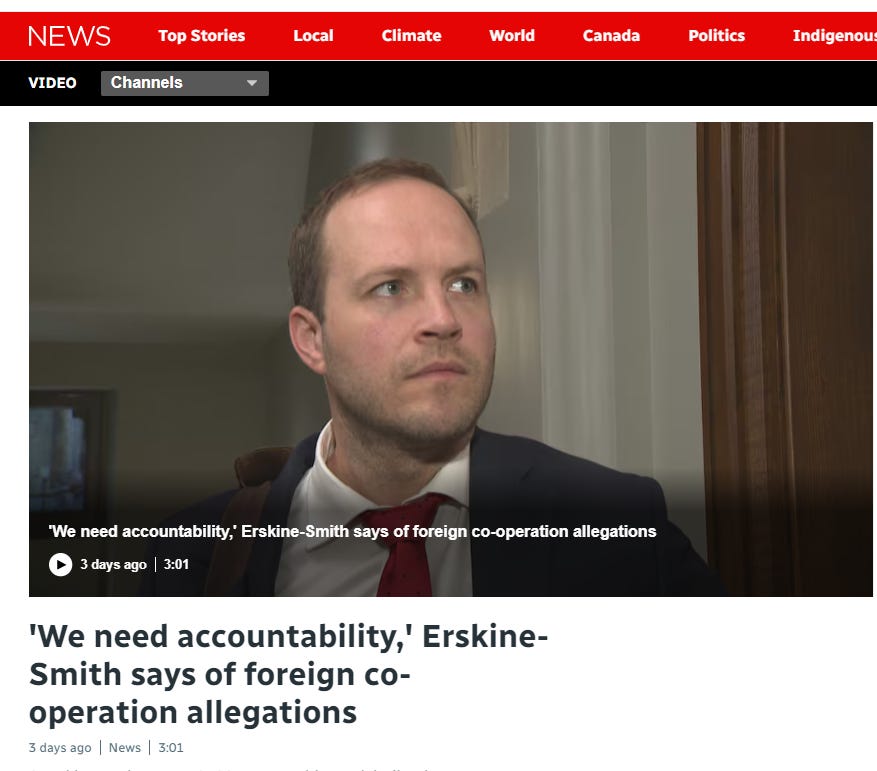Foreign interference, accountability, and due process.
Demanding names without also demanding due process is irresponsible. But we can't ignore the need for accountability either.
There must be accountability for those who have assisted foreign states and worked against our national interest.
Due process is also essential, with a credible opportunity to clear one's name.
And, yes, intelligence sources must be protected.
These are the three points I made in answering the media’s questions on my way into caucus on Wednesday (you can watch that exchange here), and they are the three points we need to consider as we see demands to “name the names.”
Without a doubt, the recent NSICOP report is damning in parts.
It finds that some elected officials "wittingly assisted foreign state actors" including by providing "confidential information to Indian officials."
It "notes a particularly concerning case of a then-member of Parliament maintaining a relationship with a foreign intelligence officer. According to CSIS, the member of Parliament sought to arrange a meeting in a foreign state with a senior intelligence official and also proactively provided the intelligence officer with information provided in confidence."
The report is also heavily redacted. We just don't know enough about the allegations and circumstances to draw firm conclusions, save in the one case that was better outlined above.
As I said earlier this week (also in the above clip), that individual should be named in the shorter term and fuller allegations should be laid out.
But demanding names without also demanding due process is irresponsible.
In some cases, that due process could be the proper forum of a court of law. Although it’s not clear that the intelligence is sufficient to base a charge upon, or that it’s possible to proceed without compromising that intelligence.
In such cases, it's possible for the intelligence to lay the foundation for further investigation, including a warrant to collect actionable evidence.
But that isn't a short term answer. And if there is never a charge or prosecution, where does that leave us?
Others have suggested that parties should simply act internally.
It goes without saying that parties should act without delay, in some cases barring MPs from caucus and from running again under a party banner.
But there is still the trouble of procedural fairness.
It seems to me there's room between a public criminal court and internal party decision-making, and that we should be debating the details of what such a process could be.
In broad strokes, the government and/or parties could create a separate process that names individuals (depending on the strength of the intelligence and the seriousness of the allegations), that offers a fuller understanding of the allegations in a manner that protects sources as necessary, and that offers a process for a fulsome reply and due process.
For example, the then-member of Parliament in that "particularly concerning case" could be named alongside his/her reply to the allegations, and with a committee meeting dedicated to hearing from them.
Of course, it's hard to say what a fair process would be for all other cases, absent details.
Finally, and I've written this before elsewhere, but we need to strengthen the role of Elections Canada in nominations (and by extension leadership races).
Too much is at stake in our democracy.
The committee found that both the PRC and India attempted to interfere in Conservative Party leadership races. It found that the PRC actively interfered in a Liberal nomination race.
Parties should generally be free to set the rules for their races.
But Elections Canada should enforce those rules.




I’ve lost all confidence in this government and no member of any party that is under scrutiny should be allowed to run under any party’s banner in the next election. A election that is long overdue to restore confidence in this country’s electoral system.
Thanks, Nate. Philippe Lagasse's argument seems reasonable to me. Stephanie Carvin says something similar. I would suggest that a pretty rapid response is vital - in a democracy, people need to be able to trust their institutions.
"All opposition party leaders should be appointed privy councillors if they aren’t already. They should then be briefed on the parliamentarians who may have been compromised and what they are alleged to have done. Based on this information, the party leaders could then decide what political precautions or sanctions are appropriate. The suspected parliamentarians could be taken off committees. They could be removed from the party caucus and be forced to sit as independents. They could then be barred from running under the party banner in the next election. These sanctions would be harder to manage in the Senate, given the grouping system, but we have recent examples of Senators who’ve been rendered black sheep in the upper house.
"What would these steps accomplish? The suspected parliamentarians would be known to the public and marginalized within the legislature. Importantly, though, they wouldn’t be publicly accused of anything. All we would know is that they’ve been sidelined. This would effectively end the political careers of the members of Parliament (MPs) among them. They’d be forever known as the MPs who did something troubling, even if they never end up being charged with a crime."